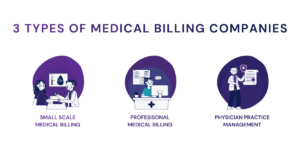Blog

Table of Contents
Employing a medical billing firm has numerous advantages for healthcare practices. These firms are comprised of experts who handle the intricate and tedious job of submitting claims to insurance companies and government programs, such as Medicare and Medicaid. By entrusting this work to a third-party, healthcare providers can concentrate on delivering care to patients instead of being concerned about reimbursement.
Moreover, medical billing companies have the know-how and resources to guarantee that claims are managed accurately, which leads to fewer denied claims and higher reimbursement rates. This can result in increased income for the practice and eventually aid in boosting the overall financial well-being of the business.
Continue reading to learn more about medical billing companies and learn how to best choose the right one for your practice.
Medical Billing Explained
The medical billing process involves the submission and monitoring of claims with health insurers to obtain payment for services rendered by a health care provider. This includes tasks such as coding and submitting claims, following up on rejected or unpaid claims and contesting rejected claims.
Essentially, medical billing is the process of submitting, following up, and collecting payment for the healthcare services provided by a healthcare provider to insurance companies or government programs like Medicare and Medicaid. The process involves coding, submitting, tracking, and appealing claims, which is complex and time-consuming, that’s why many healthcare providers prefer to outsource it to specialized companies.
How Does Medical Billing Work?
The initial step of medical billing is to accurately code the services given using codes from the Current Procedural Terminology (CPT) and International Classification of Diseases (ICD) codes. These codes are used to precisely explain the diagnosis, treatment, and procedures provided, and are mandatory for submitting claims to insurance companies.
Following the coding of services, the healthcare provider sends the claims to the insurance company for evaluation. This evaluation is done to check that all the guidelines are being followed and that the services are medically essential. If the claim is accepted, the insurance firm pays the healthcare provider as per the patient’s insurance policy. If the claim is declined, the medical billing group will investigate the insurance firm to determine why the claim was rejected and if it can be challenged.
Types of Medical Billing Companies
There are several different types of medical billing companies, each with its own unique set of services and capabilities. The particular type of medical billing company chosen should be based on the specific services and capabilities required for a healthcare facility. The types of medical billing companies are described below.

Small-Scale Medical Billing Services
A small-scale medical billing services company is a business that specializes in providing medical billing services to a limited number of healthcare providers, mainly small to medium-sized medical practices or clinics. They usually employ a small team of workers and cater to a modest number of customers, as opposed to bigger medical billing companies. Such small-scale companies offer a variety of services, like coding and submitting claims, investigating declined claims, and providing guidance and training on billing and reimbursement matters. They may also utilize specialized software to automate the billing procedure, optimize workflows and reduce mistakes.
When it comes to medical billings, smaller companies often take the time to get to know their customers and adapt their services to meet the unique needs of each client. Their lower operational costs enable them to be more flexible with their pricing, making them a great choice for medical providers with limited funds. Those who want a more direct and individualized approach to medical billing, and prefer to work with a smaller, more responsive team, should consider using a small-scale medical billing service.
Professional Medical Billing Business
Professional medical billing businesses are organizations that specialize in delivering a variety of medical billing services to healthcare providers. Their personnel are proficient and have had prior experience in the billing process, from coding and filing claims to dealing with declined claims and appeals. These companies usually provide a full package of services that includes medical billing and coding, submitting claims, collecting payments from insurance companies and patients, and dealing with denied claims and appeals. They are well-equipped with the necessary tools and know-how to make sure that claims are correctly processed and that reimbursement is maximized.
Professional medical billing businesses typically have a bigger team of workers, a greater selection of services, and a greater number of customers than small-scale medical billing companies. They may also possess more advanced technology and resources, like specialized software, to make the billing process faster and more precise. Furthermore, they are typically able to process a higher volume of claims, which can be very useful for healthcare providers with large patient numbers. While small-scale medical billing companies may offer more individualized attention and support, professional medical billing businesses are better able to manage the billing needs of big healthcare providers.
Physician Practice Management Company
Physician Practice Management (PPM) firms are organizations that offer various administrative and managerial services to physicians and other healthcare providers. These services could include coding, human resources, promotion, and financial handling. These companies generally work with many healthcare providers and can provide a comprehensive set of services to aid in the running and expansion of the practice.
One of the major differences between a PPM firm and a medical billing company is that the former offers a larger selection of services. While a medical billing company tends to concentrate on billing and compensation, a PPM company can provide a variety of support services to help manage the practice and increase its overall efficiency. This could include services such as marketing, financial management, personnel, and operational management.
Another difference between the two is that medical billing firms generally collaborate with one physician or healthcare provider at a time and may specialize in a particular area of billing, for example, insurance-related billing or specialty billing. PPM organizations, on the other hand, usually work with multiple medical care providers simultaneously, supplying them with a selection of services that are customized to their individual requirements.
How to Choose The Right Medical Billing Company
When it comes to picking a medical billing company, it is essential to take into account several factors that can have an effect on the financial well-being of a healthcare practice. Here are several key points to bear in mind while selecting a medical billing company:
Services Offered
It is essential to review the services offered by each company to make sure they can fulfill your needs and requirements. This could involve determining if you need a full-service medical billing company or one that is more specialized in one area, such as insurance-specific billing or specialty billing. It is important to take into account the services offered before making a decision, as this will affect how successful the billing process is for your practice.

Software and Technology
It is essential to carefully weigh the pros and cons of technology and software when considering a billing company. Ensure that the company you select uses advanced software and technology to automate the billing process, as this eliminates manual error and streamlines the process. Additionally, look for a company that can offer detailed reports and analytics to help you gain insight into the financial performance of your practice. This allows you to make informed decisions and drive better financial outcomes.
Pricing and Terms
It is important to compare pricing and contract terms between different companies before committing to any service in order to ensure that you are getting a fair and reasonable price. It is important to read the contract carefully and take note of what services are included, as well as any exclusions, to understand the full scope of services offered. Additionally, it is pertinent to be familiar with the terms of the contract in order to prevent any misunderstandings down the line.
Support and Communication
Communication and support are essential components of any successful client-business relationship. You should always inquire about how responsive a company is when considering engaging with them. Be sure to ask if they can provide fast responses to your questions or inquiries, as this is key to a positive customer experience. Evaluate each potential company by its communication and support capabilities – it will help you determine which one is the best fit for you.
Questions You Should Ask
When deciding to employ a medical billing company, there are some critical questions that you should ask to ensure that the company is right for your practice. The following are important questions to ask when choosing the right medical billing company:

What is Their Background in Medical Billing?
First, find out about their background in medical billing and how long they have been operational. Understanding the background and experience of the billing company’s staff in medical billing can give an idea of their level of expertise and qualifications.
What Security Measures Do They Have in Place?
Secondly, inquire about their security and confidentiality measures to guarantee that patient data is safeguarded. Knowing the security measures in place to protect patient data can give an idea of the company’s commitment to data security and its ability to protect sensitive information.
How Do They Submit and Manage Claims?
Also, make sure to ask about how they submit claims, what they do with denied or rejected ones, and their approach to appeals and disputes. Knowing how the billing company handles denied or rejected claims can give insight into their level of expertise and dedication to getting claims paid.
Can They Provide References?
Find out if they can provide references from current/former customers. Checking references from other healthcare providers can provide insight into the company’s track record and level of service.
How Do They Operate?
Understanding the billing and collection process can give an idea of how the company operates and how it will work with the practice. Knowing how the company handles patient billing and collections can give an idea of how they will communicate with patients and handle any issues that may arise.
How Do They Communicate?
You may also want to explore the way they communicate with healthcare providers and insurers, their pricing and contract details, and the customer service and support they provide, such as the availability and response times for addressing issues. Knowing how the company communicates with healthcare providers can help ensure there is clear and timely communication.
Hansei Solutions—Medical Billing For You
When it comes to medical billing, accuracy and reliability are paramount. With Hansei Solutions, you can trust that all of your needs will be met with the highest degree of precision and attention to detail. We’re available to answer any questions or concerns you may have, and provide insight into how our services can help optimize your medical billing system.
Don’t wait – reach out to Hansei Solutions today and learn more about how we can make a difference for your business. Call us today.

Ready to focus on providing healthcare? Let us lighten your load.
We’re here to address your pain points and create growth opportunities for your organization. We’re passionate about what we do, and it shows in every interaction. Learn what makes us tick and schedule a demo today.